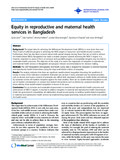| dc.description.abstract | The target date for achieving the Millennium Development Goals (MDGs) is now closer than ever.
There is lack of sufficient progress in achieving the MDG targets in many low- and middle-income countries.
Furthermore, there has also been concerns about wide spread inequity among those that are on track to achieve
the health-related MDGs. Bangladesh has made a notable progress towards achieving the MDG 5 targets. It is,
however, important to assess if this is an inclusive and equitable progress, as inequitable progress may not lead to
sustainable health outcomes. The objective of this study is to assess the magnitude of inequities in reproductive
and maternal health services in Bangladesh and propose relevant recommendations for decision making The 2007 Bangladesh demographic and health survey data is analyzed for inequities in selected maternal and reproductive health interventions using the slope and relative indices of inequality.The analysis indicates that there are significant wealth-related inequalities favouring the wealthiest of society in many of the indicators considered. Antenatal care (at least 4 visits), antenatal care by trained providers such as doctors and nurses, content of antenatal care, skilled birth attendance, delivery in health facility and delivery by caesarean section all manifest inequities against the least wealthy. There are no wealth-related inequalities in the use of modern contraception. In contrast, less desired interventions such as delivery by untrained providers and home delivery show wealth-related inequalities in favour of the poor.For an inclusive and sustainable improvement in maternal and reproductive health outcomes and achievement of MDG 5 targets, it essential to address inequities in maternal and reproductive health interventions. Under the government’s stewardship, all stakeholders should accord priority to tackling wealth-related inequalities in maternal and reproductive health services by implementing equity-promoting measures both within and outside the health sector. | en_US |

